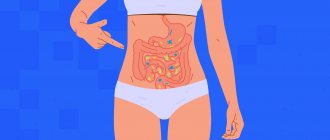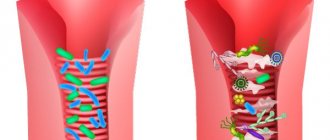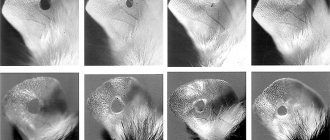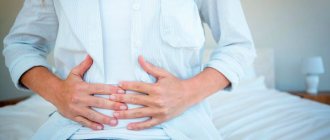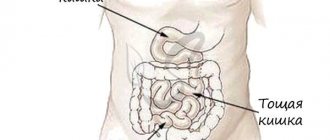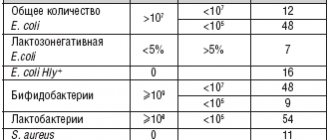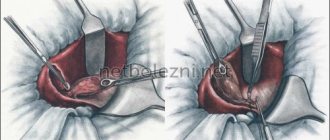Author, editor and medical expert - Klimovich Elina Valerievna.
Editor and medical expert - Harutyunyan Mariam Harutyunovna.
Number of views: 147 683
Last update date: 16.02.2022
Average reading time: 9 minutes
Causes of frequent loose stools in adults Diseases accompanied by frequent loose stools Treatment
Chronic diarrhea is an extremely inconvenient problem to discuss, so patients initially try to ignore it. However, repeated attacks of abdominal pain, discomfort, loose stools and frequent trips to the toilet prevent normal work and study, travel and communication with people. With such complaints, the patient sooner or later consults a doctor.
Chronic diarrhea is usually referred to as frequent, loose stools that persist for more than 3 weeks1. In this case, the feces become unformed or liquid, and bowel movements occur more than 3 times a day1.
The frequency of stool in long-term intestinal disorders is of secondary importance. The traditional idea that the intestines should be emptied once a day in the morning is far from the truth. Even healthy people can have bowel movements up to 3 times a day1. The main sign of diarrhea is a change in the consistency and volume of stool, the presence of pathological impurities in them. If the stool is unformed and contains blood, pus, mucus or undigested food debris, one bowel movement per day is enough to indicate a gastrointestinal tract (GIT) disorder1.
Top
What is diarrhea?
The main sign that we are not talking about episodic diarrhea, but about a full-fledged disorder, is the daily frequency of stool. Diarrhea is loose stool that occurs in paroxysms: three times a day or more often. At the same time, the water content in feces, normally 50-80%, increases to 95%1.
Diarrhea can be acute or chronic.
Acute form
(up to 14 days) may appear as a result of poisoning, eating allergenic foods2, intolerance to certain foods, medications, or the entry of certain viruses and bacteria into the body2.
Chronic
(from a month or more) - as a result of taking antibiotics, laxatives. The cause may also be certain diseases of the gastrointestinal tract2.
The second most important sign is the condition of the stool. Color, consistency and the presence of impurities may indicate various diseases. For example, watery and loose stools, as well as a greenish tint to the stool, indicate the development of an intestinal infection. The cause of loose stools that are light in color and clayey in appearance may be damage to the small intestine and its initial sections.
First aid measures for diarrhea
If you experience diarrhea or other signs of gastrointestinal distress, do not delay seeing a doctor. The specialist will quickly make the correct diagnosis and prescribe treatment. However, before the doctor arrives, you can alleviate your condition:
● drink more fluids (water, dried fruit compotes, strong tea) to prevent dehydration
● give up heavy fatty foods, flour, sweets, spices and herbs, fresh vegetables and fruits
● eat more starchy soft foods - porridge, stewed vegetables, mashed potatoes, unsweetened baked goods made from premium flour
● drink enterosorbents (Sorbex, Enterosgel, Polysorb, Laktofiltrum)
Causes of loose stools
Episodes of loose stools that plague a person for one or several days are not a separate disease. This is just one symptom of functional, organic or neural dysfunction. Loose stools that persist for a long time may be accompanied by other clinical manifestations: abdominal pain and cramps, fever, chills, nausea, vomiting, dizziness. It is on the basis of a set of symptoms that one can most accurately determine the cause of loose stools.
The most common causes of diarrhea in adults are3:
- food allergies;
- lactose intolerance (almost instantaneous reaction to milk);
- intestinal infection;
- viral or bacterial infection;
- neurogenic factor (stress, neurotic disorders, emotional breakdowns).
Loose stools may also indicate pathologies of other organs, such as4:
- cystic fibrosis (a hereditary disease that affects a number of organs, from the liver to the gonads);
- pancreatitis (a group of diseases associated with inflammation of the pancreas);
- gastritis with secretion deficiency;
- oncological diseases;
- adrenal insufficiency;
- diabetes;
- hyperthyroidism (a syndrome caused by increased hormonal activity of the thyroid gland);
- cirrhosis of the liver;
- hepatitis;
- metabolic kidney diseases;
- hypovitaminosis (metabolic diarrhea).
Survey
Watery diarrhea always indicates problems with the digestive system. A gastroenterologist or infectious disease specialist examines patients with complaints of watery diarrhea. To verify the clinical diagnosis, a comprehensive examination of the gastrointestinal tract is necessary using laboratory and instrumental methods to detect morphological changes and establish the cause of diarrhea. The most valuable in diagnostic terms are:
- Radiography
. Using plain radiography of the abdominal cavity, the condition of the patient's gastrointestinal tract is quickly assessed. For a detailed study of the inner surface of the digestive tract, oral contrast with barium sulfate is used. The method is quite informative in detecting non-infectious processes that cause watery stools. - Ultrasonography
. A non-invasive examination method is used as a screening diagnosis to exclude severe organic diseases of the digestive system and neoplasms. An abdominal ultrasound can reveal signs of an inflammatory process. Sonography is also performed to assess the condition of the pancreas. - Stool analysis
. To study the processes of digestion and absorption of food, a microscopic examination of feces is carried out with pH measurements. Watery diarrhea is often caused by infectious processes, so all patients undergo bacteriological culture of stool and analysis for helminth eggs. To exclude ulcerative destructive processes, the Gregersen reaction is indicated. - Serological reactions
. Searching for antimicrobial antibodies or specific antigens in the blood is the most accurate way to determine various infectious diseases, especially viral ones. The study may not be sufficiently informative in the first few days from the onset of the disease, when the concentration of antibodies in the blood has not yet increased.
As an additional general clinical method, a biochemical blood test is used to help determine the degree of malabsorption and protein deficiency. If specific lesions of the gastrointestinal tract wall are suspected, endoscopic examination with biopsy is recommended. To assess the exocrine function of the pancreas, a blood test for amylase and lipase is sometimes prescribed.
Adsorbents are used to reduce the frequency of watery diarrhea
Treatment of loose stools: how to get rid of the problem
If frequent loose stools bother you for a long time, then most likely its causes lie in a serious imbalance and require immediate treatment. Unlike one-time diarrhea, systematic diarrhea implies complex treatment, which includes not only eliminating symptoms, but also addressing the underlying causes of the syndrome.
Infectious diarrhea
Treatment depends on the form of infectious diarrhea. In mild cases, home therapy is quite possible, including diet, drinking plenty of fluids and taking adsorbent drugs. A severe form of gastroenteric diarrhea requires hospitalization with a whole range of emergency procedures and restorative therapy, which consists of restoring the lost fluid balance and following a diet.
Functional diarrhea
Occurs in disorders of the digestive or nervous system. There are no organic changes in the gastrointestinal tract, and therefore the main treatment in this case is symptomatic. If it is possible to remove the causes of a nervous disorder or irritable bowel, then loose stools may go away within one or two days5.
Dairy and fermented milk foods
A huge percentage of adults suffer from milk intolerance. Diarrhea may worsen if the patient had an intestinal or viral infection the day before. In addition, milk from different producers is digested differently.
A large number of patients have lactose deficiency, i.e. milk intolerance. The degree of activity of these enzymes can be explained by racial, ethnic and individual characteristics of the body. As for fermented milk products, they are acceptable in the treatment of diarrhea, as they normalize the intestinal microflora, eliminate flatulence and fermentation. “Three-day” kefir prepared using a starter for 3 days will help fix the stool.
Diet is a reliable assistant in the treatment of diarrhea
Treatment of diarrhea resulting from poor diet or malnutrition, as well as disruptions in the gastrointestinal tract, is impossible without proper nutritional correction.
If you adhere to the basic principles of a diet for diarrhea, the problem can be solved much faster, and at the same time will serve as a prevention of possible intestinal dysfunction.
Here are some simple diet rules for diarrhea:
- the load on the digestive organs during diarrhea should be minimal (food should be consumed crushed and boiled);
- You should eat foods high in pectin, potassium and protein, for example, bananas, applesauce, fruit juices, bananas, beef, turkey, chicken.
- in the first days you should eat only liquid food and gradually switch to your usual diet, introducing foods as the frequency of loose stools decreases6;
- food intake should be fractional, in small portions 5-6 times a day.
It is important to remember that prolonged, exhausting loose stools are a reason for immediate consultation with a specialist.
Symptomatic therapy
Diet correction is required. In case of an acute disorder, a starvation diet is indicated with the gradual introduction of rice dishes, products containing pectins, salted soups, broths, dietary protein foods (veal, turkey, chicken, hard-boiled eggs). Diarrhea with water causes a significant amount of fluid to be lost, so if the patient's condition is satisfactory, it is important to ensure that the patient drinks plenty of fluids to prevent severe dehydration.
Until the exact cause of stool disorders is determined, adsorbents, astringents and enveloping agents are used to reduce the frequency of watery diarrhea. Under no circumstances should you take medications that inhibit intestinal motility, as this can increase intoxication and lead to a deterioration in the patient’s condition. Antibacterial agents and antidiarrheal drugs are selected only by a doctor, taking into account the results of the examination and the sensitivity of pathogenic microorganisms.
Smecta, Polysorb, Enterosgel
Smecta is an antidiarrheal, adsorbent agent of natural origin. It is excreted from the body in its original form, having time to absorb toxins and infections that poison the intestines. When treating an adult, the contents of the sachet are dissolved in 100 ml of water, mixed thoroughly and distributed into 3 doses. Smecta for children with diarrhea is diluted in 50 ml of water and given along with semi-liquid food. A drug:
- easy to use;
- pleasant to the taste;
- effective for any diarrhea;
- allows you to cope with bloating, heartburn, and intestinal pain.
Polysorb is based on colloidal silicon dioxide, a substance with powerful adsorbing and detoxifying properties. Indicated for loose, watery stools, vomiting, nausea, and elevated body temperature caused by intoxication of the body.
Contraindicated in case of gastric bleeding, intestinal obstruction, peptic ulcer in the acute period.
Taking enterosorbents is advisable for diarrhea, treatment of allergies, dysbacteriosis, liver diseases, gall bladder, dermatological problems, and helminth infections.
Enterosgel is an enterosorbent that can cope with the symptoms of diarrhea of any origin. Available in the form of gel and capsules. It does not affect the absorption of nutrients by the intestine, helps restore normal microflora, and eliminates dysbacteriosis caused by taking antibiotics. Allowed at any age. The duration of treatment is 5 days.
Fully or partially limited products
Products containing fiber are excluded: vegetables (you can add decoctions to soup), bran, rye and bran bread, whole grain bread, with the addition of seeds and cereals.
Fresh bread, pastries, and flour products cause fermentation and rotting in the intestines. For the same reason, jam, dried fruits, honey, and sweets are not allowed. Sugar in limited quantities (50 g per day is added to all dishes).
Porridges made from coarse cereals (millet, barley, pearl barley), legumes are poorly digestible foods and must be excluded. Rich fatty broths are prohibited, as they enhance peristalsis, fatty meats, fish, and canned food.
Whole milk, cream, sour cream and cheese can to some extent cause diarrhea. Milk in diluted form can only be used for making puddings.
Kvass, cocoa and coffee with milk, carbonated drinks increase peristalsis and bloating, and are therefore unacceptable. You cannot eat sauces, marinades, or smoked foods.
Table of prohibited products
| Proteins, g | Fats, g | Carbohydrates, g | Calories, kcal | |
Vegetables and greens | ||||
| vegetables | 2,5 | 0,3 | 7,0 | 35 |
| vegetables legumes | 9,1 | 1,6 | 27,0 | 168 |
| potato | 2,0 | 0,4 | 18,1 | 80 |
| horseradish | 3,2 | 0,4 | 10,5 | 56 |
Fruits | ||||
| bananas | 1,5 | 0,2 | 21,8 | 95 |
| melon | 0,6 | 0,3 | 7,4 | 33 |
Berries | ||||
| grape | 0,6 | 0,2 | 16,8 | 65 |
Mushrooms | ||||
| mushrooms | 3,5 | 2,0 | 2,5 | 30 |
Nuts and dried fruits | ||||
| dried fruits | 2,3 | 0,6 | 68,2 | 286 |
Cereals and porridges | ||||
| pearl barley | 9,3 | 1,1 | 73,7 | 320 |
| Wheat groats | 11,5 | 1,3 | 62,0 | 316 |
| millet cereal | 11,5 | 3,3 | 69,3 | 348 |
| barley grits | 10,4 | 1,3 | 66,3 | 324 |
Flour and pasta | ||||
| pasta | 10,4 | 1,1 | 69,7 | 337 |
Bakery products | ||||
| vysivkovy bread | 9,0 | 2,2 | 36,0 | 217 |
| Old Russian grain bread | 9,6 | 2,7 | 47,1 | 252 |
| Rye bread | 6,6 | 1,2 | 34,2 | 165 |
Confectionery | ||||
| jam | 0,3 | 0,2 | 63,0 | 263 |
| jam | 0,3 | 0,1 | 56,0 | 238 |
| candies | 4,3 | 19,8 | 67,5 | 453 |
| cookie | 7,5 | 11,8 | 74,9 | 417 |
Ice cream | ||||
| ice cream | 3,7 | 6,9 | 22,1 | 189 |
Cakes | ||||
| cake | 4,4 | 23,4 | 45,2 | 407 |
Raw materials and seasonings | ||||
| seasonings | 7,0 | 1,9 | 26,0 | 149 |
| mustard | 5,7 | 6,4 | 22,0 | 162 |
Dairy | ||||
| kefir | 3,4 | 2,0 | 4,7 | 51 |
| sour cream | 2,8 | 20,0 | 3,2 | 206 |
Cheeses and cottage cheese | ||||
| cheese | 24,1 | 29,5 | 0,3 | 363 |
Meat products | ||||
| pork | 16,0 | 21,6 | 0,0 | 259 |
| ham | 22,6 | 20,9 | 0,0 | 279 |
Sausages | ||||
| dry-cured sausage | 24,1 | 38,3 | 1,0 | 455 |
| sausages | 10,1 | 31,6 | 1,9 | 332 |
| sausages | 12,3 | 25,3 | 0,0 | 277 |
Bird | ||||
| duck | 16,5 | 61,2 | 0,0 | 346 |
| goose | 16,1 | 33,3 | 0,0 | 364 |
Fish and seafood | ||||
| dried fish | 17,5 | 4,6 | 0,0 | 139 |
| smoked fish | 26,8 | 9,9 | 0,0 | 196 |
| canned fish | 17,5 | 2,0 | 0,0 | 88 |
Oils and fats | ||||
| vegetable oil | 0,0 | 99,0 | 0,0 | 899 |
| animal fat | 0,0 | 99,7 | 0,0 | 897 |
| cooking fat | 0,0 | 99,7 | 0,0 | 897 |
Non-alcoholic drinks | ||||
| bread kvass | 0,2 | 0,0 | 5,2 | 27 |
Juices and compotes | ||||
| juice | 0,3 | 0,1 | 9,2 | 40 |
| * data is per 100 g of product | ||||
Amoxicillin, Nifuroxazide, Furazolidone
Amoxicillin, based on chloramphenicol, a substance that can eliminate long-term diarrhea. It has a wide spectrum of action and inhibits the proliferation of most pathogenic bacteria, including those that have developed resistance to tetracycline drugs. Features of the product include:
- availability, low price;
- time-tested efficiency;
- versatility;
- presence of an impressive list of contraindications and side effects.
Furazolidone is an intestinal antibiotic with broad antimicrobial activity. Used for infectious diarrhea resulting from food poisoning. Available in tablets that are swallowed whole without chewing or crushing. The duration of treatment is usually 2 weeks, even after the person no longer vomits and the diarrhea has stopped. Features of the drug:
- accessibility, high efficiency, speed;
- inability to be taken by pregnant, lactating women and young children.
Nifuroxazide is a powerful antimicrobial agent for diarrhea in adults and children, which has a pronounced bacteriostatic effect. Suppresses the intensive production of elements leading to general intoxication of the body. Available in tablets and suspensions with banana flavor. Indicated for infectious diarrhea, stool disorder, diarrhea of unknown etiology. It has no serious contraindications (except for individual intolerance), rarely provokes side effects and does not contribute to the appearance of dysbacteriosis.
Menu (Power Mode)
It is necessary to organize 6 meals a day, preferably alternating protein dishes (beef, chicken, fish, turkey, cottage cheese) and cereals. Eggs can also be included in the diet daily. Below is an example menu that can be changed according to your capabilities and desires, observing the basic principles of heat treatment and the set of permitted products.
First day
Unloading (hungry).
Second day
| Breakfast |
|
| Lunch |
|
| Dinner |
|
| Afternoon snack |
|
| Dinner |
|
| For the night |
|
The third day
| Breakfast |
|
| Lunch |
|
| Dinner |
|
| Afternoon snack |
|
| Dinner |
|
| For the night |
|
Fourth day
| Breakfast |
|
| Lunch |
|
| Dinner |
|
| Afternoon snack |
|
| Dinner |
|
| For the night |
|
Imodium, Enterobene, Loperamide
Imodium is considered the best antidiarrheal drug, which instantly stops watery stools without signs of colitis with painful and frequent urge to defecate. When the question arises, what to take if an adult has diarrhea, immediately drink two Imodium tablets, and then with each new trip to the toilet, one more. The drug quickly reduces the tone of the intestinal muscles and inhibits peristalsis.
Enterobene is used as a symptomatic treatment for diarrhea. Reduces intestinal motility by binding to opioid receptors in its walls. Increases the transit time of intestinal contents, increases the tone of the anal sphincter, lasts 4-6 hours. Dosage for acute diarrhea: adults: 4 mg of the active substance; children: 2 mg.
Comparative table of drugs that inhibit intestinal motility:
| Name of the drug | Active ingredient | Duration of admission | Daily dosage for adults, mg |
| Imodium | Loperamide hydrochloride | No more than 48 hours | 16 |
| Enterobene | Loperamide hydrochloride | No more than 48 hours | 16 |
| Loperamide | Loperamide hydrochloride | No more than 48 hours | 16 |
Loperamide is an inexpensive medicine available in tablets and capsules. Allows you to slow down diarrhea, regardless of the cause that caused it. Contraindicated in children under 4 years of age, pregnant women, and people with renal failure. The daily dosage for adults is 16 g. It acts quickly and effectively.
Authorized Products
The basis of the diet for diarrhea is pureed porridge from semolina, rice (white), buckwheat and oatmeal, which are prepared in water or broth (low-fat). Butter is added in the amount of 5 g per serving, up to 50 g per day. It is allowed to eat wheat bread, but dried bread or crackers. You can consume 200 g of not very fried crackers and some inconvenient dry biscuits per day.
Soups are also prepared in low-fat fish or meat broth, adding permitted cereals, a minimum of vegetables, pureed meat, egg flakes, quenelles, and meatballs.
Meat products allowed: lean beef, chicken and turkey meat, veal, rabbit. The meat is additionally degreased, and the tendons and skin are removed from the poultry. The meat is served in the form of boiled minced meat, steamed cutlets or meatballs. Cutlets and meatballs can be stewed in a saucepan with water. When preparing cutlets, add boiled rice (instead of bread) or semolina to the minced meat. You can also make pate from boiled meat.
Low-fat varieties of fish are also prepared chopped (in the form of quenelles, cutlets, meatballs). They are also boiled by steaming or in water. From eggs, which are allowed in the amount of 1-2 per day, steam omelet, they are cooked soft-boiled or added to soups.
It is possible to use cottage cheese, but it must be unleavened (non-acidic) and mashed; it can be used to make steamed soufflés and casseroles. Vegetables are eaten only as a supplement, pureed, in soups and in very small quantities.
Astringent products are allowed: berry jelly from blueberries, rowan, sloe, dogwood, quince, bird cherry, persimmon, pear and fruit drinks from them, as well as pureed raw apples or applesauce. If well tolerated, you can drink fresh juices diluted (1:1 with water) (only from non-acidic berries). The exception is grape, apricot and plum juice, which enhance intestinal motility and have a laxative effect.
Herbal teas, rosehip decoction, infusion of bird cherry, dried dogwood, blueberries, tea (strong green and black), still water are allowed.
Table of permitted products
| Proteins, g | Fats, g | Carbohydrates, g | Calories, kcal | |
Fruits | ||||
| quince | 0,6 | 0,5 | 9,8 | 40 |
| pomegranate | 0,9 | 0,0 | 13,9 | 52 |
| pears | 0,4 | 0,3 | 10,9 | 42 |
| apples | 0,4 | 0,4 | 9,8 | 47 |
Berries | ||||
| cranberry | 0,5 | 0,0 | 6,8 | 26 |
| blueberry | 1,1 | 0,4 | 7,6 | 44 |
| chokeberry | 1,5 | 0,2 | 10,9 | 55 |
Nuts and dried fruits | ||||
| dried pears | 2,3 | 0,6 | 62,6 | 249 |
Cereals and porridges | ||||
| buckwheat (kernel) | 12,6 | 3,3 | 62,1 | 313 |
| semolina | 10,3 | 1,0 | 73,3 | 328 |
| cereals | 11,9 | 7,2 | 69,3 | 366 |
| white rice | 6,7 | 0,7 | 78,9 | 344 |
Bakery products | ||||
| white bread crackers | 11,2 | 1,4 | 72,2 | 331 |
Confectionery | ||||
| Maria cookies | 8,7 | 8,8 | 70,9 | 400 |
Dairy | ||||
| acidophilus | 2,8 | 3,2 | 3,8 | 57 |
Cheeses and cottage cheese | ||||
| cottage cheese 0.6% (low fat) | 18,0 | 0,6 | 1,8 | 88 |
Meat products | ||||
| boiled beef | 25,8 | 16,8 | 0,0 | 254 |
| boiled veal | 30,7 | 0,9 | 0,0 | 131 |
| rabbit | 21,0 | 8,0 | 0,0 | 156 |
Bird | ||||
| boiled chicken | 25,2 | 7,4 | 0,0 | 170 |
| turkey | 19,2 | 0,7 | 0,0 | 84 |
Oils and fats | ||||
| butter | 0,5 | 82,5 | 0,8 | 748 |
Non-alcoholic drinks | ||||
| mineral water | 0,0 | 0,0 | 0,0 | — |
| green tea | 0,0 | 0,0 | 0,0 | — |
| black tea | 20,0 | 5,1 | 6,9 | 152 |
| * data is per 100 g of product | ||||
